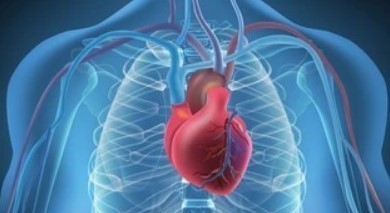

Cardiovascular diseases (CVDs) continue to be one of the leading causes of death worldwide, affecting millions of people every year. These conditions include a variety of diseases that affect the heart and blood vessels, such as heart disease, strokes, and high blood pressure. While modern medicine offers many treatments for CVDs, lifestyle changes, a heart-healthy diet, and natural remedies can play an important role in prevention, management, and supporting heart health.

Cardiovascular diseases refer to a group of disorders that affect the heart and blood vessels. These include conditions such as:
Coronary Artery Disease (CAD): Narrowing of the blood vessels that supply blood to the heart, often leading to heart attacks.
Heart Failure: A condition in which the heart cannot pump enough blood to meet the body's needs.
Arrhythmias: Abnormal heart rhythms that can disrupt the proper functioning of the heart.
Stroke: Occurs when there is a blockage or rupture in the blood vessels leading to the brain, depriving it of oxygen and nutrients.
Peripheral Artery Disease (PAD): Narrowing of the blood vessels in the limbs, often causing pain or cramps.
Several factors increase the likelihood of developing cardiovascular diseases. While some are genetic or age-related, others can be managed or prevented through lifestyle changes:
Unhealthy Diet: Diets high in saturated fats, processed foods, and salt can increase cholesterol and blood pressure.
Lack of Physical Activity: A lack of exercise contributes to obesity, hypertension, and poor heart health.
Smoking: Smoking damages blood vessels and reduces the oxygen available to the heart.
High Blood Pressure (Hypertension): This condition overloads the heart and blood vessels, increasing the risk of heart attack and stroke.
High Cholesterol: Elevated levels of LDL ("bad" cholesterol) can cause plaque buildup in the arteries.
Diabetes: High blood sugar levels damage blood vessels and increase the risk of heart disease.
Obesity: Excess weight puts extra strain on the heart and increases the risk of hypertension, high cholesterol, and diabetes.
Stress: Chronic stress can lead to poor lifestyle habits that damage heart health.
Family History: A family history of heart disease can increase your risk of developing similar conditions.
Many aspects of heart disease can be prevented or managed with natural strategies. Below are some lifestyle changes and natural remedies that can significantly support heart health.
A healthy diet is one of the most effective ways to prevent and manage cardiovascular diseases. Focus on foods that lower cholesterol, blood pressure, and promote good circulation: - Fruits and vegetables: Rich in antioxidants, vitamins, and minerals that help reduce inflammation. - Whole grains: Foods such as oats, quinoa, and brown rice are high in fiber, which helps reduce cholesterol. - Healthy fats: Include unsaturated fats from avocados, olive oil, and nuts. Omega-3 fatty acids from fish help reduce inflammation. - Legumes and beans: Rich in fiber, protein, and essential nutrients for heart health. - Avoid processed foods: Reduce the consumption of trans fats, refined sugars, and excessive sodium.
Regular physical activity strengthens the heart, improves circulation, and helps maintain a healthy weight, all essential for cardiovascular health. Aim for at least 30 minutes of moderate exercise most days. Benefits of exercise for the heart: - Reduces blood pressure. - Improves cholesterol levels by increasing HDL ("good") and reducing LDL ("bad"). - Helps control weight and reduces the risk of obesity and diabetes. - Stimulates circulation and strengthens the heart muscle.
Chronic stress can negatively impact heart health by raising blood pressure, causing inflammation, and leading to harmful habits. Finding ways to reduce stress is essential for maintaining cardiovascular health. Stress-relieving techniques: - Mindfulness meditation: Focus on deep breathing and relaxation to reduce stress. - Yoga: Combines breathing with physical postures to relieve stress and improve circulation. - Deep breathing exercises: Slow, deep breathing calms the nervous system and reduces heart rate. - Time in nature: Walking or spending time outdoors significantly reduces stress and promotes mental well-being.
Certain herbs and natural supplements have been shown to support heart health by reducing inflammation, lowering blood pressure, and improving circulation. Hawthorn berries: This herb has been used for centuries to support heart function, lower blood pressure, and improve circulation. Garlic: Known for its ability to reduce cholesterol levels and lower blood pressure, garlic can be consumed raw or in supplement form. Omega-3 Fatty Acids: Found in fish oil or plant sources such as flaxseed and chia seeds, omega-3s help lower triglycerides, reduce blood pressure, and prevent blood clots. CoQ10 (Coenzyme Q10): A powerful antioxidant that supports heart function and reduces blood pressure. Turmeric: Contains curcumin, an anti-inflammatory compound that can help reduce inflammation and cholesterol.
Being overweight or obese puts extra strain on the heart and increases the risk of developing conditions such as high blood pressure, high cholesterol, and diabetes. Maintaining a healthy weight is essential to prevent cardiovascular diseases. Weight control tips: - Eat nutrient-rich foods: Focus on whole, minimally processed foods that provide essential vitamins and minerals. - Practice portion control: Pay attention to portion sizes to avoid overeating. - Incorporate physical activity: Exercise regularly to help maintain a healthy weight and promote overall cardiovascular health.
Both smoking and excessive alcohol consumption are significant risk factors for cardiovascular diseases. Smoking damages blood vessels, reduces oxygen levels in the blood, and increases inflammation. Excessive alcohol consumption can raise blood pressure and contribute to weight gain. - Quit smoking: Seek professional help or support groups if needed. There are many resources available to help you quit. - Limit alcohol: If you drink alcoholic beverages, do so in moderation. The American Heart Association recommends no more than one drink per day for women and two for men.

Natural Approaches to Relieve Pain and Support Joint Health. Rheumatic diseases are a group of autoimmune and inflammatory conditions...

Understanding the Causes and Natural Ways to Restore Balance. Hormones are powerful chemical messengers that regulate many...

Natural Ways to Soothe and Support Skin Health. Our skin is not just the largest organ in the body — it’s a reflection of our overall health...
Stay updated with our latest news, tips, and offers by following us on social media. Become part of the Mira Cura community and share your journey toward natural health and wellness.
Do you have questions or want to learn more about our products? Feel free to reach out to us. Our team is here to help you find the best solutions for your health.
Mira Biotic